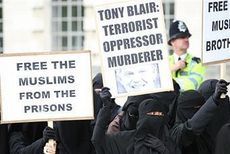 The conviction of seven Muslim protestors for shouting nasty things at returning British soldiers was a grave and dangerous assault upon freedom of speech. I don’t care how foul the men are, or how provocative their beards might be, nor how smug they appeared on the court steps after the verdict – it was still wrong. I don’t really care, either, if they are the only seven people in the country to believe that the soldiers were “rapists” and “murderers”, although I would bet that there are plenty more.
The conviction of seven Muslim protestors for shouting nasty things at returning British soldiers was a grave and dangerous assault upon freedom of speech. I don’t care how foul the men are, or how provocative their beards might be, nor how smug they appeared on the court steps after the verdict – it was still wrong. I don’t really care, either, if they are the only seven people in the country to believe that the soldiers were “rapists” and “murderers”, although I would bet that there are plenty more.
By charging the men we surrendered moral superiority; we compromised our liberality and, dare I say it, decency in order to punish people we do not like. People who fit into our hastily constructed paradigm of “Bad Islam”. This new notion – that there is a Bad Islam and a Good Islam, and the adherents of the former may be subjected to whatever deprivations and punishments we care to inflict – is neither helpful nor just. Bad Islam is an endlessly shifting concept and can include whoever we wish to include – it now embraces, for example, Muslim women who wear copious veils and the once highly regarded Muslim Council of Britain. I wrote about this three years ago – and the double standards have got worse. In the case of these seven nutters, the defence solicitor Kyri Argyropolous made the argument that the decision to charge the men was “ironic” because the British troops had been “fighting for freedom”. Well, up to a point, Kyri. A stronger defence would have been to quote John Stuart Mill from 1859:
“We can never be sure that the opinion we are endeavouring to stifle is a false opinion; and if we were sure, stifling it would be an evil still.”
It almost goes without saying that the strongest condemnation of the convictions has come from Peter Tatchell. It matters not to Tatchell that these men would, if they found themselves in government, immediately chop his head off, or flay him to death. Freedom of speech is unconditional.







Comments